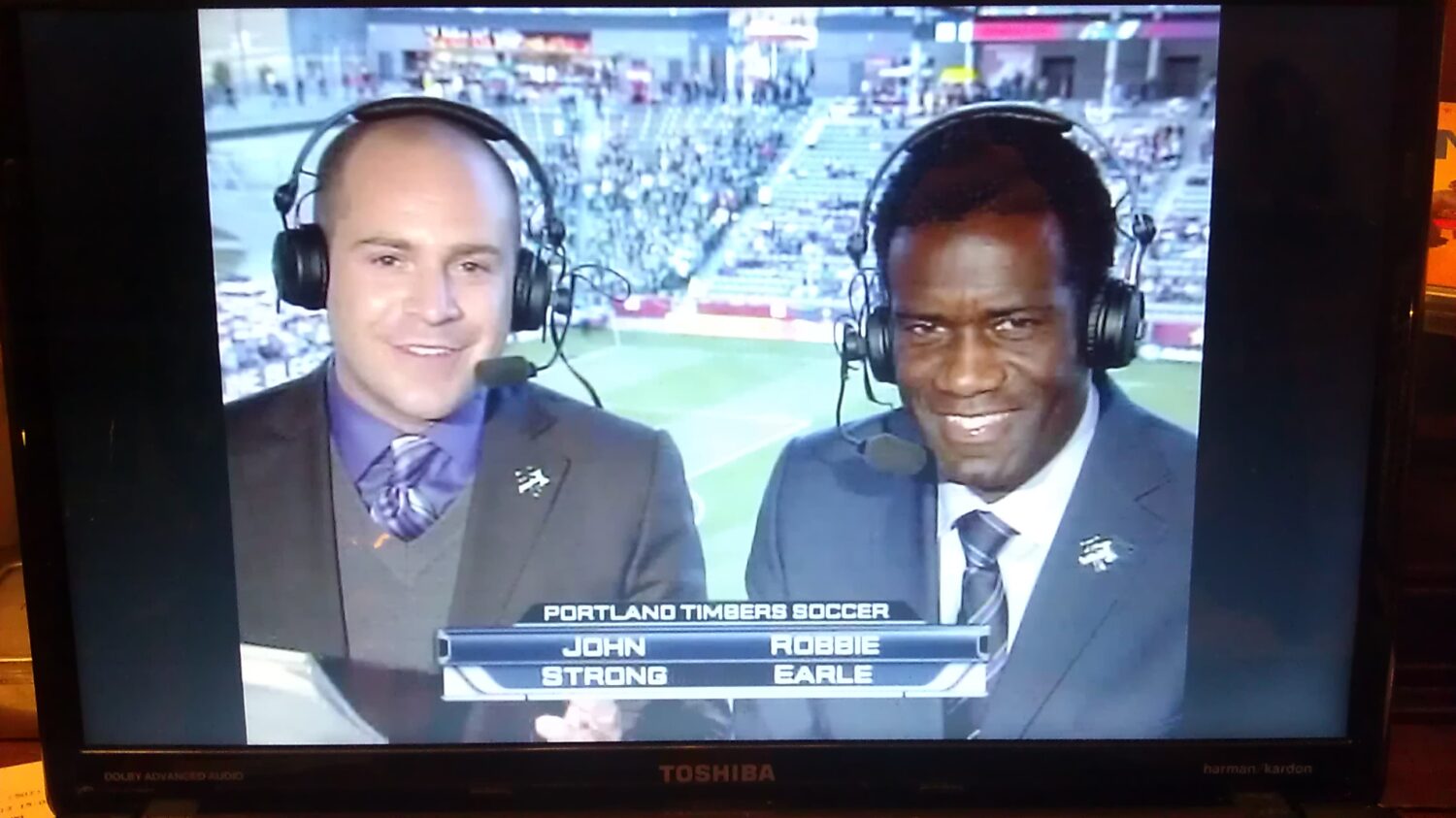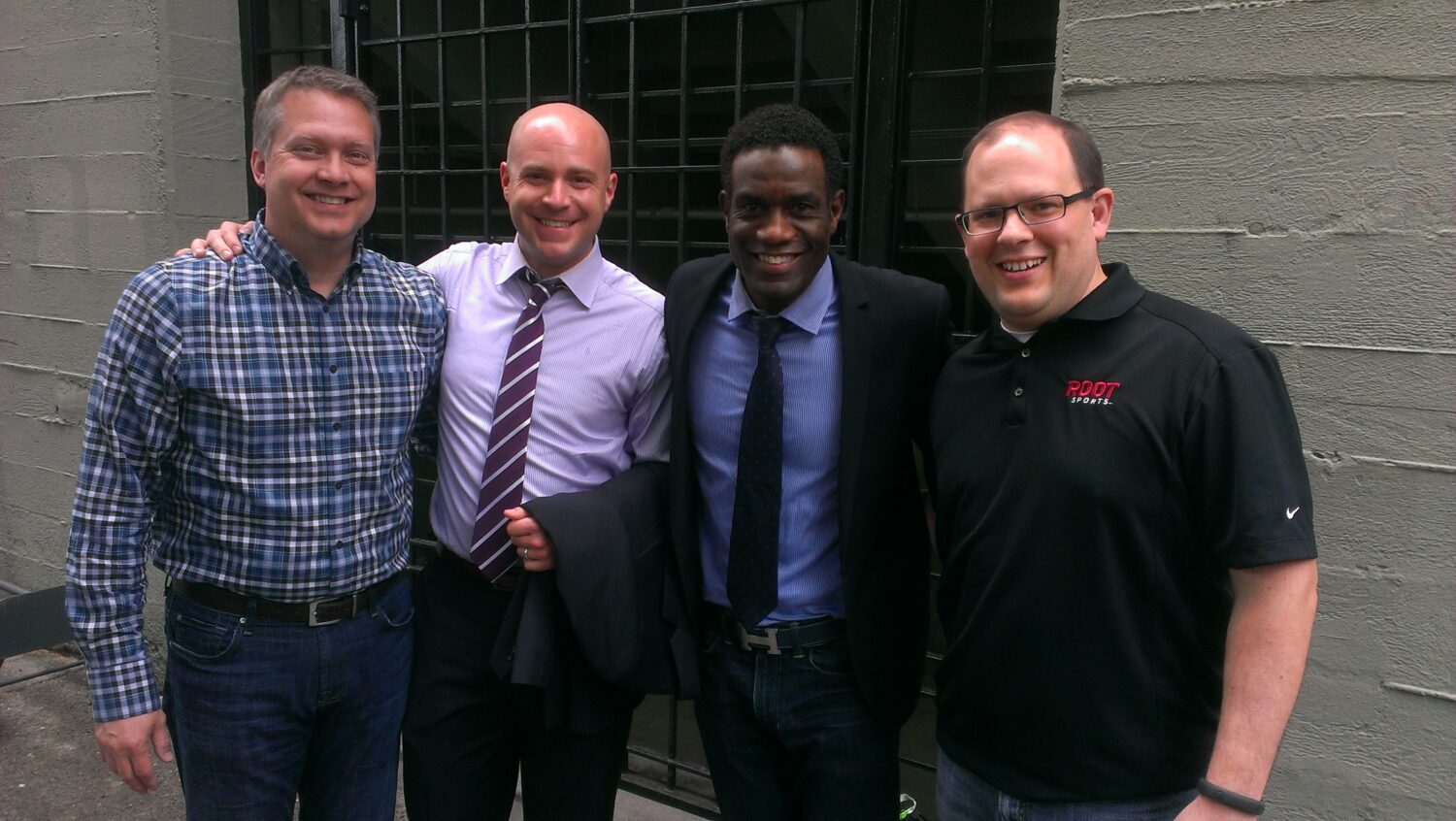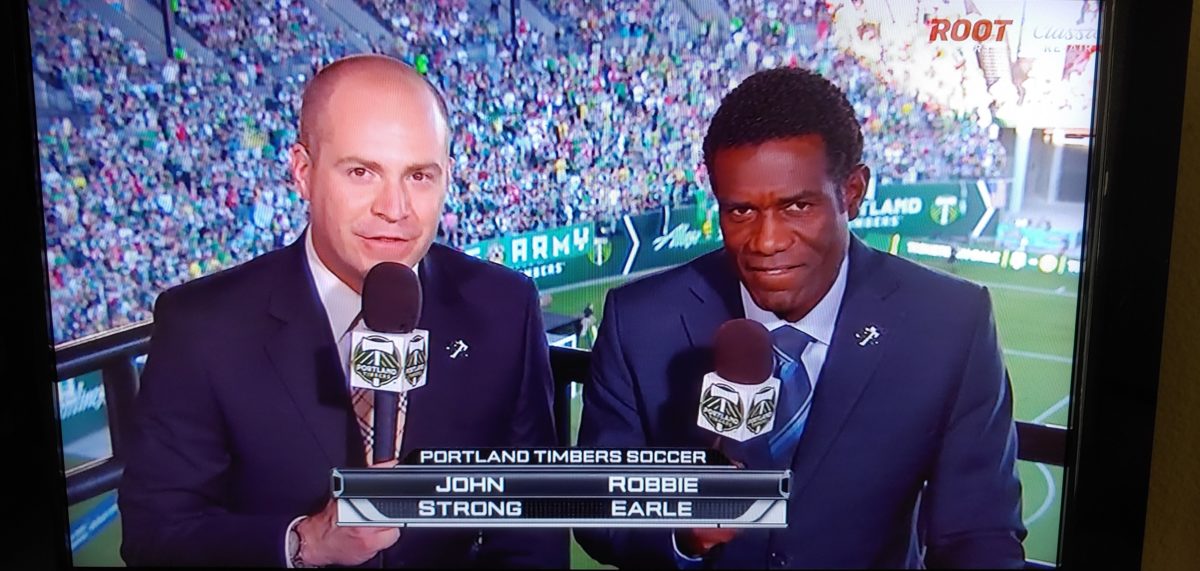Look through the names of past and present Portland Timbers broadcasters, and you’ll find a who’s who of American soccer media. Jake Zivin’s voice can be heard both locally on ROOT Sports and nationally on Fox Sports. Nat Borchers and Ross Smith both have their own place in Timbers history, on and off the field. Preceding them, John Strong is now the play-by-play voice of North American soccer on Fox Sports, while Robbie Earle is a staple of English Premier League studio coverage on NBC Sports. The common thread between them? They all got their start in American soccer broadcasting by covering the Portland Timbers.
A few weeks ago, Strong tweeted a picture of his television screen. On the screen were both him and Earle on the catwalk at Providence Park, filming a pregame segment. Nearly a decade younger, both men wore black suits with Stand Together pins on their left lapels. At that point in time, few could have predicted the highs to which their careers were about to ascend.
From 2011 to 2013, Strong and Earle were the voices of the Timbers, forging a unique relationship and chemistry early on. At the time, it was considered an odd pairing. Around MLS, the English personality was typically the play-by-play voice, while the American filled in as color analyst. Portland flipped the script.
“It was really the first time anyone had done that,” Strong said.
Before coming to Portland, Earle had a playing career in England, playing midfield for both Port Vale and Wimbledon. After hanging up his cleats, he spent ten years covering soccer in England until around 2010, when he decided to try his hand in America. One of the first people to reach out was Timbers President of Business Mike Golub, who sold him on the city and vision of a franchise that was about to enter Major League Soccer.
“It was immediately obvious to the team that as an option for our broadcast, this guy would bring instant credibility to our announcer team,” the Timbers’ vice president of broadcasting, Matt Smith, said.
And while the organization had to go across the pond to find Earle, Strong was right in their backyard. A talented yet inexperienced 25-year old radio broadcaster out of the University of Oregon, Strong covered some of the team’s final USL games and was chosen to continue broadcasting games in MLS.
The two leaned on one another during those years. If Strong needed to talk to the TV truck, Earle was prepared to cover for him. Earle, meanwhile, learned about American media, as well as how to always be prepared, from Strong.
“His unending patience with me,” Strong began. “The amount of battles that he fought for me that I didn’t realize at the time. Things I was just too young and stupid to realize that I was saying on the air that I didn’t need to be. I was way, way too young to have that job really, and the way Robbie acted as a firewall sometimes, with people that were annoyed with things that I have done or said that I didn’t know until years later—it was very appreciated.”

Alongside Earle, Strong had another helping hand in longtime friend Erick Olson. Growing up, Strong and Olson had helped found the broadcasting program at Lake Oswego High, then spent their college years calling UO games together. In 2011, Strong asked Olson to help keep stats and spot from the booth. Olson knew his friend’s weaknesses and echoed how valuable Earle was during the early days of Strong’s career.
“We got the chance to start with not a whole lot of safety net, just a whole lot of trust,” Olson said. “It wasn’t like we were getting a ton of feedback, unless we sought it out, through college. So having Robbie come in and help us with those things was very beneficial.”
Strong still recalls a lot from his time with the Timbers. Over the phone, he named some of the early players from that 2011 team with painstaking detail, even recalling the health situation among the three goalkeepers at the time. Strong is a storyteller, and 2011 provided him with plenty of stories to tell.
There was the Timbers’ first home game against Chicago where, as the rain poured down, he couldn’t help but watch Earle, who looked stunned while absorbing the moment. The team won its first five home games—a feat no other expansion team before them had accomplished—blew out the eventual shield- and MLS Cup-winning Los Angeles Galaxy, and put an end to Real Salt Lake’s 18-game unbeaten streak.
In July, Strong spent the moments right before the Timbers and Sounders met in MLS for the first time watching the US Women’s National Team beat Brazil in the World Cup quarterfinal. That was his first time meeting Alexi Lalas, who came into the radio booth that day to watch the ending. Unfortunately for Timbers supporters, the game that followed didn’t have the same happy conclusion.
“There was such incredible energy in the building that day,” Strong said. “The Timbers led twice, but ultimately gave up a late equalizer on an Ozzie Alonso penalty. It was absolutely soul-crushing. That was one of the biggest gut-punch losses for the Timbers, really maybe even ever, because to lose in that way was rough.”
Over two years in Portland, Strong was never at a loss for words. But behind the scenes, there was one moment that came close: the team’s first-ever MLS game.
“I remember our first game against the Colorado Rapids where we talked about what opener we wanted, we didn’t want to get in the way of the club,” Earle said. “I remember the kick-off and turning to John to shake hands, which we did before every game for good luck, and he had tears streaming down his face. I didn’t realize how much the Portland Timbers meant to him as someone coming from the area, going to the lower leagues, working in football.
“In that first game in MLS, how emotionally it caught him. He had these Portland Timbers cufflinks on his shirt. It caught me off guard and made me say, ‘wow.’ If these are the emotions of a broadcaster who does very professional work, I was thinking about fans at home and the responsibility we had.”
It was those passionate fans that blew Earle away as soon as he arrived in Portland. He still believes that he and Strong had the best gig in MLS at the time, and still fondly cherishes the memories of passing fans lined up at the gates of Providence Park hours before every home game.
Growing up in England, and with experience playing in some of the most hostile environments in Europe, Earle compared Portland fans to some of the most passionate supporters in England.
“Not in terms of numbers, but in terms of love of the football club, [Portland] would probably be more like Newcastle United or Leeds United,” Earle said. “Two very strong identity clubs. When you go to those areas, you never see people in those cities wearing any other shirts. If you come from Leeds, you support Leeds. If you come from Newcastle, you wear black and white. I always think the Timbers are like that. The only soccer shirt you see people wearing with pride would be the Portland Timbers.”
According to Smith, when Earle was with the team, road dinners were full of stories that nobody on the TV crew could get enough of—stories of his time playing for a Wimbledon team nicknamed the “Crazy Gang,” and of playing for Jamaica. It was that paternal nature that helped Earle build great relationships among the entire broadcast crew, but particularly with Strong.

If there was a single moment that cemented the pair’s relationship, it came on October 2 in Vancouver.
Back in September, Strong had suffered from a case of pneumonia that later resulted in a collapsed lung. Just ten days after surgery, he made the trip to call the team’s 1–0 victory over the Whitecaps, but he was not himself.
“He came back a week or ten days too early,” Earle said. “He traveled up to Vancouver and didn’t look great in all honesty. He was quite pale and looked as though he was still not 100%. But, being John, he wanted to be back because he felt it was his responsibility.
“Thinking back on it, the one thing John brings to a broadcast is energy. When he came back, he didn’t have that same energy, and a couple of times I caught him having to catch a breath and take a moment.”
Strong later admitted the same thing. Back in 2011, he acted in haste.
“I should not have called that game,” Strong emphatically said. “I had no business doing that game. I looked sickly, I lost a bunch of weight, it was a disaster. But I was so desperate. I had finally gotten this dream job, and now it’s like it was being taken away.
“I remember doing that game in Vancouver and Robbie almost like a dad. He got emotional, having me back, and he gave me a big hug. It was a really nice moment even though I shouldn’t have been there.”
Looking back, those days meant a lot to Strong and Earle, but also to Olson. Watching his friend develop his career right in front of his eyes, in their hometown, was a special experience. Olson later accompanied Strong to the World Cup in Russia, but still reflects on 2011, which he knows was just the start of a long journey.
“Seeing something grow and, at the same time, watching my friend, who I had been broadcasting with since we were seniors in high school, grow into this role was special,” Olson said. “To go from the guy who is working really hard to make connections, to the guy who drives convincing people to put the Timbers on the radio so that there is a radio home for this professional team, to the guy who becomes the first TV broadcaster for this team. How much that meant and how hard he worked to get that done while at the same time making a real connection with the team. It was incredible”
So, back to that picture from the 2011 broadcast.
“Could any of us have predicted at game one that two and a half years later John would be the national voice on a network?” Smith asked. “I don’t think any of us would have predicted that, but by the time 2013 rolled around I was able to look at John’s peers around Major League Soccer and immediately knew that he was in the upper echelon of MLS announcers.”
For nearly a decade, the Timbers MLS history has been marked by inconsistent play on the field, an MLS Cup, and even a little bit of magic. But, through it all, there has been a talented television crew to tell the story. And it all began with John Strong and Robbie Earle back in 2011.
“Lots of people forget that the team was really darn competitive in 2011, right up until the end of the season,” Smith said. “There was a great atmosphere in Portland, a new expansion team that was upping the ante in Major League Soccer. But they were also competitive, and the Timbers were competing to be in the playoffs in year one. 2011 was exciting on all fronts, every aspect of it, and I think we had a great broadcast, great announcers, and the product we put on air was second to none.”

